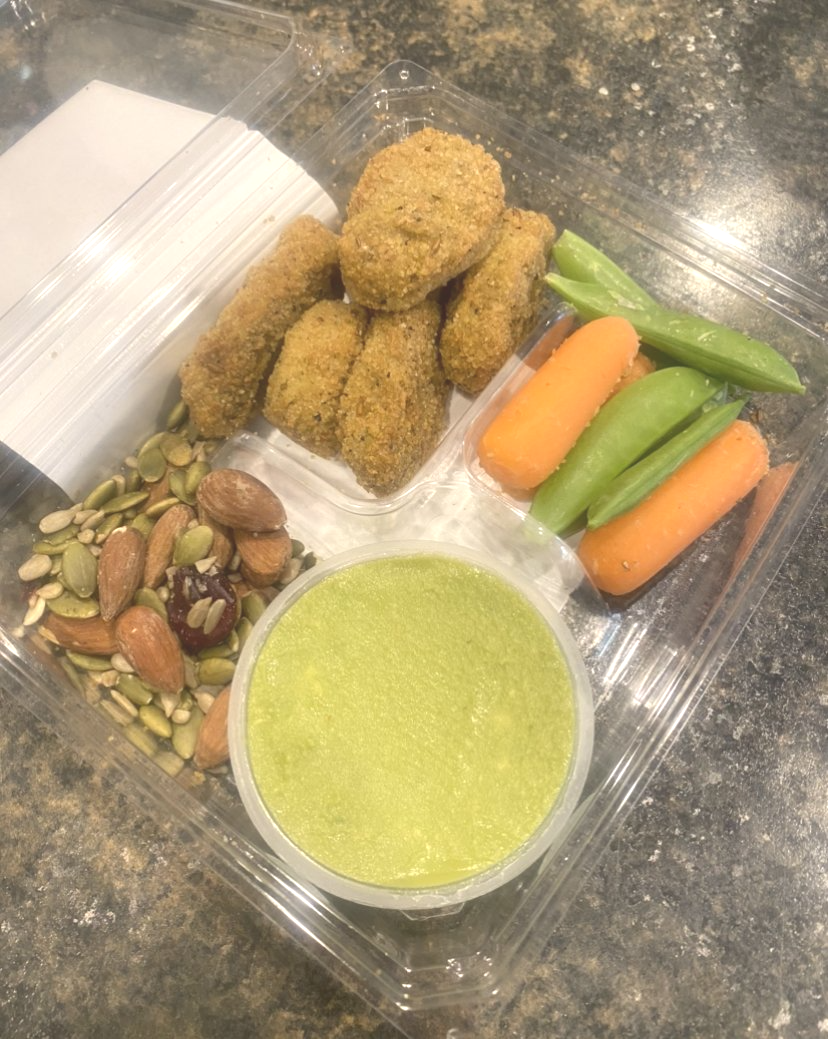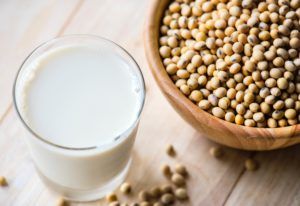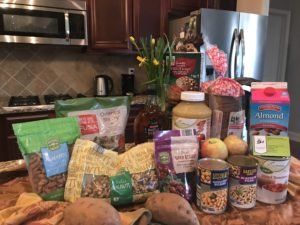Do Vegetarians and Vegans Need a Vitamin B-12 Supplement?
- By Karen Moss, RDN
- •
- 06 Jun, 2018
- •
Hello VV Spotters! In my last nutrition post we talked about protein needs for vegetarians and vegans. For this post, let’s look at another nutrient that is important to pay attention to in the vegetarian and vegan (VV) diet: Vitamin B-12. Vitamin B-12 is an essential micronutrient that is needed for normal neurological function and to make red blood cells and DNA. Vegetarians, and vegans in particular, can be at risk for inadequate vitamin B-12 intake. Let’s talk about why that is.
Ever heard any of these before? B-12 can be made by bacteria in the mouth or the gut, so vegans don’t need a supplement…Don’t wash your vegetables and you can get B-12 from the soil left on them...I can get enough B-12 from fermented foods, nori, spirulina, or chlorella algae....These are myths and let’s set the record straight today with evidence-based information to help you decide if you need a B-12 supplement.
Food sources
Vitamin B-12 is not found in foods of plant origin. It is only found in animal sources where it is made either in the animal’s intestines or through it’s own diet. Therefore, fish, poultry, meat, eggs, and dairy foods are all good sources of B-12. Though it is true that our own small intestines can make some B-12, it is not enough to rely on to prevent deficiency. Vitamin B-12 from sources such as fermented foods, seaweeds, algae, or organic produce is either not supported by research or do not provide reliable amounts of B-12. This debunks the myths mentioned at the beginning of the blog and if you’d like to read more about it click here for research presented by Jack Norris, a health expert in the vegan community.
Because B-12 occurs naturally in animal foods only, fortified plant sources of B-12 are where those eating VV need to look for sources. Some examples include ready to eat cereals, meat analogues, soymilk, nutritional yeast, and protein bars. Be sure to check the label of foods when looking for fortified sources since not all types of these products are fortified and the amounts used in fortified products may change over time.
The Recommended Dietary Allowances of B-12 for a healthy adult is 2.4 mcg/day. If you’re a vegetarian that consumes dairy and eggs, you are more likely to get enough B-12. If you are a more strict vegetarian, or vegan especially, then you need to be sure to include fortified food sources and/or supplements.
Deficiency
Now that we’ve talked about sources of B-12, you can see how those who consume a VV diet could be at risk for deficiency. So what does B-12 deficiency look like?
"Vitamin B12 deficiency is characterized by megaloblastic anemia, fatigue, weakness, constipation, loss of appetite, and weight loss. Neurological changes, such as numbness and tingling in the hands and feet, can also occur. Additional symptoms of vitamin B12 deficiency include difficulty maintaining balance, depression, confusion, dementia, poor memory, and soreness of the mouth or tongue. The neurological symptoms of vitamin B12 deficiency can occur without anemia, so early diagnosis and intervention is important to avoid irreversible damage. During infancy, signs of a vitamin B12 deficiency include failure to thrive, movement disorders, developmental delays, and megaloblastic anemia."-Office of Dietary Supplements vitamin B-12 Fact Sheet
Another myth out there is that it takes years to become deficient in B-12. When someone becomes vegan, it is true that they likely have enough B-12 stored in their liver to prevent a severe deficiency for many years, however the beginning markers of B-12 deficiency can actually be found after only a few months. Therefore, you can imagine how vitally important it is for a pregnant or nursing VV mother to ensure adequate B-12 intake, so that her infant does not develop deficiency since the child will have no such reserves at birth. Untreated B-12 deficiency in a baby could result in permanent neurological damage, so be sure to consult a doctor or pediatrician about supplementation if you are pregnant, nursing, or feeding your child a VV diet. Older adults are also at an increased risk of deficiency since it is common as we age for the stomach to make less acid, making absorption of B-12 a problem. Other GI disorders can put one at risk as well.
Studies have shown that vegans who did not supplement with B-12 showed higher levels of homocysteine, a byproduct of protein metabolism, that when elevated is associated with increased risk of dementia, heart disease, and stroke.
Folate or folic acid, which VV eaters tend to get high levels of in their diet, can actually mask a B-12 deficiency by correcting anemia, but not fixing and maybe even exacerbating neurological damage. It is not recommended for healthy adults to consume more than 1,000 mcg/day of folic acid a day.
It is a good idea for all VV eaters to talk to their doctors about testing their B-12 status.
Supplements
Most supplements come in the form of cyanocobalamin. Other forms you may see are methylcobalamin and hydroxocobalamin. Good news is that the form of B-12 used in supplements and fortified foods is made by bacteria and is not sourced from animals (but always be sure to check the other ingredients in the supplement to ensure it is vegan if that’s your goal). No one form of B-12 has been shown to be more bioavailable or better absorbed than others. Absorption depends more on the body’s ability to absorb it. In fact, a healthy adult who takes a 500 mcg supplement probably only absorbs about 10 mcg of it. Sublingual tablets or lozenges are not superior, so don’t be fooled by any marketing saying it is. Intramuscular injections by prescription can be used for severe deficiency or for those with malabsorption issues.
Take home recommendations from the Vegetarian Nutrition Dietetic Practice Group:
-If you are a vegetarian, especially a vegan, you should ingest a reliable vitamin B12 source, such as fortified foods or supplements.
-Ask your doctor if your vitamin B12 level should be checked on an annual basis.
-Regularly use foods fortified with vitamin B12 and/or take vitamin B12 supplements.
-Ensure your vitamin B12 is adequate prior to becoming pregnant, during pregnancy, and while breastfeeding.
-Older vegetarians, especially vegans, may need higher doses of B12 due to age-related absorption problems.
-Higher doses may be needed for individuals who are already deficient.
Learn more about this topic by perusing the sources for this post. Thanks for reading!
Sources:
Position of the Academy of Nutrition and Dietetics: Vegetarian Diets. Melina, VesantoCraig, WinstonLevin, Susan et al. Journal of the Academy of Nutrition and Dietetics , Volume 116 , Issue 12 , 1970 – 1980.
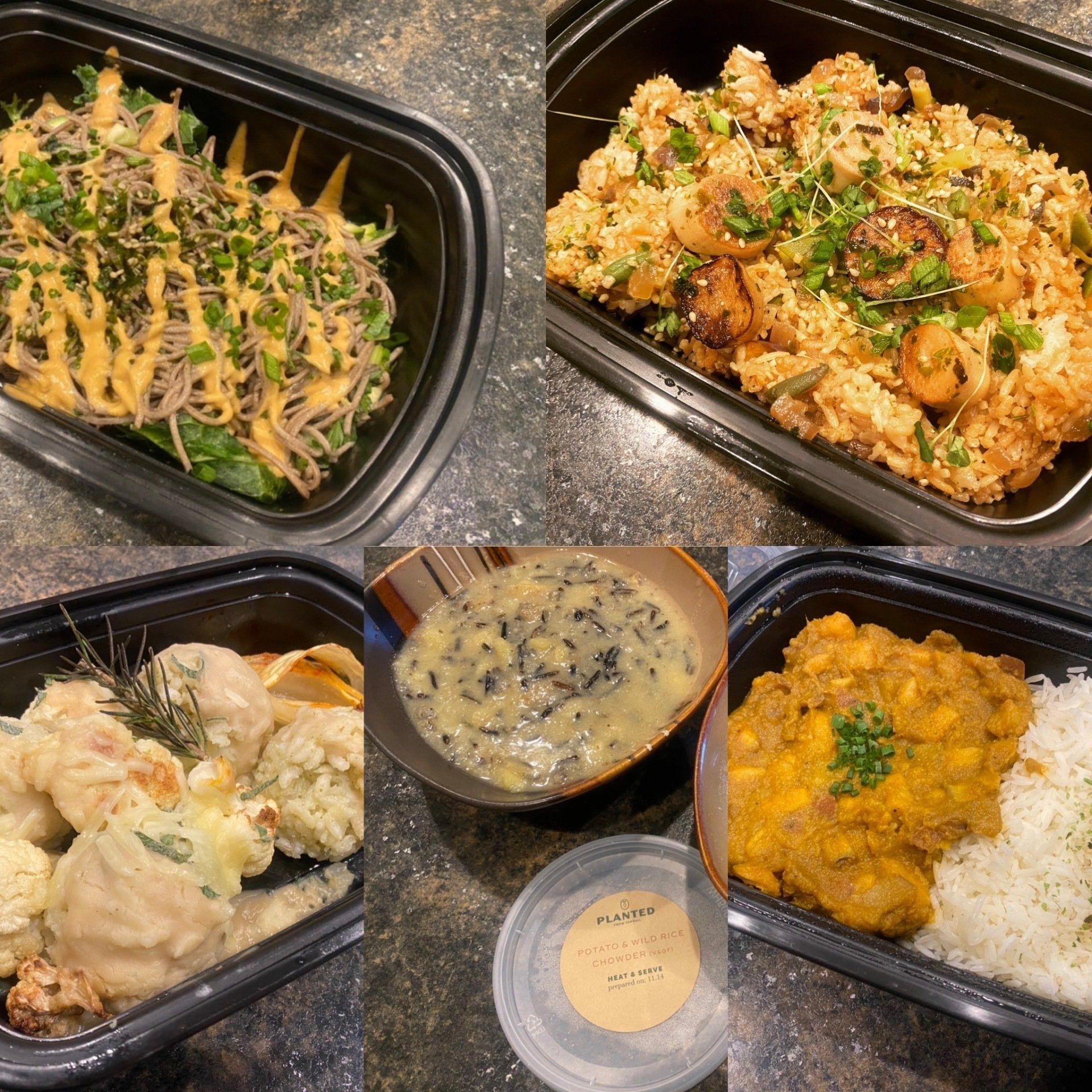
Topsoil Kitchen and Market, located in downtown Travelers Rest, SC is a farm to table restaurant featuring a James Beard Foundation Semifinalist Chef, that has some of the best offerings you can find in the Upstate. They host various events including Supper Club and festivities, offer Whole Foods Plant Based options and provide the opportunity to purchase fresh groceries!
We recently had the opportunity to taste some of Topsoil’s “Planted” options and we were truly impressed! Their Planted Meal Plan, which is a weekly ready to eat meal kit, offers award winning chef-made 100% locally sourced and absolutely delicious meals. Each kit includes five meals, that are freshly prepared with flavor and nutrition in mind for only $75!
First, we have a delectable Soba Salad consisting of peanut sauce, ginger, scallion, and furikake. This picturesque dish had a delicious peanut and gingery taste; offering a protein packed dish that requires no heating! Next, is one of our favorites, the Fried Jasmine Rice with King Trumpet Mushrooms. This dish was bursting with flavor in every bite and the mushrooms provided a meaty texture that will please any palate. Third, is the Truffled Cauliflower Risotto; a dish topped with lightly sprinkled vegan cheese. This savory dish would satisfy any type of eater. Next, is the Potato and Wild Rice Chowder. This soup will comfort you on a chilly day, providing a savory taste with great texture to give you enough fiber to keep you full. Lastly, we have the Sweet Potato Green Curry. This curry dish was delicious from start to finish. It could satisfy any palate, which had enough spice to provide the necessary flavor, but not too much for those who can’t handle the heat. Each dish was amazing and easy to heat and serve. Most serving sizes of the meals can actually feed two people; however, Topsoil Kitchen & Market recognizes that most individuals would only be satisfied if they had each dish for themselves.
In addition to providing delicious cuisine, health is a factor in almost all of the dishes. A Plant Based Whole Foods (PBWF) diet is a lifestyle in which one eats minimally processed foods including: fresh fruits, vegetables, legumes, and grains. Topsoil Kitchen & Market meets the needs of individuals aiming to sustain a healthy diet including PBWF. The Planted Meal Plans change each week since the food is locally grown. These dishes are straight farm to kitchen from their trusted farmers and Topsoil’s very own farm. This is delicious food you can trust (especially during the pandemic). When you look at the nutritional aspect, you are most definitely getting the necessary nutrients to sustain a healthy lifestyle. For more information about Topsoil Kitchen and Market and their Planted Meal Plans menu, please visit https://www.topsoilrestaurant.com/.

Netflix, Hulu, and Disney + are just a few of the apps that have us glued to our seats and beds while in quarantine. It is hard to get out and go exercise when you can binge watch your favorite shows. Additionally, with the rainy season, it’s tough to go outside and exercise if you don’t have a gym membership. We want to give you some tips on how you can exercise or stay active while in your room or living room.
-
Pick a setting and exercise. Do your favorite exercise (i.e. 10 jumping jacks, 10 burpees, 20 sit-ups, etc.) everytime the show you are watching has a scene in a certain setting (i.e. an office setting or an outside setting, etc.).
-
Make some moves during commercials. If you are using Hulu, live TV or another app that has commercials, do an exercise when the commercials come on.
-
Sit and burn calories at the same time. If you want to sit while you exercise. Click here to learn what you can do with some dumbbells and/or can goods.
-
Move-it with board games. If you like board games add exercises to it, similar to the above commercial breaks. Do an exercise directly after your turn until it comes back to you. Make it unique and add your own twist to various board games to make them more physically active.
Just remember, a healthy body incorporates 80% healthy eating and 20% active living. It is easy to overdo it with physical activity. Drink plenty of water, take breaks and most of all, HAVE FUN!

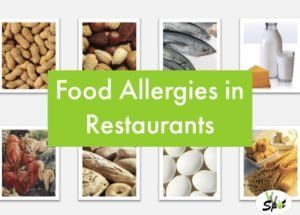
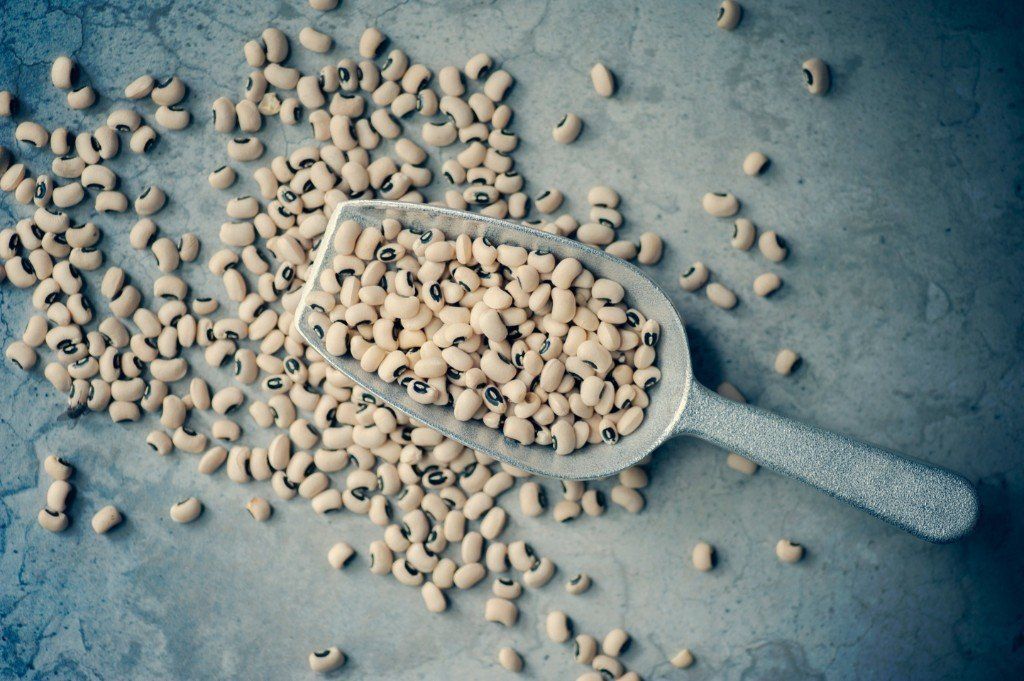
How do you get enough protein?!
Does that sound like a familiar question as a vegetarian/vegan (VV)? Or is it a question you asked yourself when transitioning to this lifestyle? Turns out it’s not as difficult as one might think. In fact, VV eating patterns provide enough, often more than enough, protein when total calorie intake is sufficient.
Complete vs Incomplete Protein Myth:
Protein is a macronutrient that plays numerous roles in the body. It’s a main structural component of muscle, skin, blood, etc. and much, much more. Protein is made up of building blocks called amino acids. Our body can make some amino acids on its own, but others are considered ‘essential,’ meaning the only way to get them is to eat them. That’s where the terms ‘complete’ and ‘incomplete’ protein come in to play. Complete proteins are foods that have all the amino acids the body needs (like meats) and incomplete proteins only have some of the amino acids (like beans). From this came the idea that a person would need to combine incomplete protein foods to create a complete, or complementary, protein. For example, eating rice and beans together. However, we now know that the body can pool the amino acids in the liver and use them as needed to create complete proteins, therefore there is no need to combine proteins specifically at each meal. So all of that to say….don’t sweat trying to create ‘complete’ proteins in your VV diet! Odds are you will eat enough of all the amino acids throughout your day. For funsies though, it is cool to know that there are a few plant-based ‘complete’ proteins like soy and quinoa!
How much do I need?
The Recommended Daily Allowance (RDA) for protein is based on an average adult needing 0.8g protein/kg body weight. This comes out to 46g of protein a day for an adult female and 56g of protein a day for an adult male, on average. You can see this chart here. Of course, this will vary throughout the lifecycle and children, adolescents, elderly, pregnant or lactating women, and athletes will have higher needs.
If you’re vegetarian, these RDAs apply to you too since protein from eggs and dairy are easily digested. Vegan sources of protein aren’t quite as easy to digest and therefore vegans may benefit from upping their protein needs to 1.0 g protein/kg body weight and even slightly higher for older individuals.
If you’re unsure if you’re meeting this threshold of protein needs one way to check yourself is to log a few days of your typical eating pattern in a food diary like My Fitness Pal or Super Tracker. And as always, if you have more in-depth questions it is wise to consult with a Registered Dietitian Nutritionist.
Lysine, a special consideration in the vegan diet:
Lysine, one of those essential amino acids we mentioned earlier, is considered the limiting amino acid in the vegan diet. If you’re eating a varied vegan diet you’re likely doing ok. But it’s worth making sure you always include legumes such as beans, peanuts, and soy in the diet to make sure you are getting enough of the essential amino acid lysine. Vegan experts recommend at least 3 servings a day of legumes. To learn more about this and see serving sizes, click here to read information put together by Jack Norris, a Registered Dietitian with a great website about veganism or visit JackNorrisRD.com
Super cool fun fact about environmental impact:
“To produce 1 kg protein from kidney beans requires 18 times less land, 10 times less water, 9 time less fuel, 12 times less fertilizer, and 10 times less pesticide in comparison to producing 1 kg protein from beef.”- -Position of the Academy of Nutrition and Dietetics: Vegetarian Diets
Amazing, right?!
Enough already, just tell me what to eat!:
In a nutshell (pun intended), nuts, seeds, beans, peas, soy, and whole grains are great sources of plant-based protein. But let’s not reinvent the wheel! Here are some links to trustworthy resources to see protein sources in the VV diet:
Thanks for reading! What nutrition topics would you like to hear about next?
Sources:
-
Position of the Academy of Nutrition and Dietetics: Vegetarian Diets. Melina, VesantoCraig, WinstonLevin, Susan et al. Journal of the Academy of Nutrition and Dietetics , Volume 116 , Issue 12 , 1970 – 1980.
